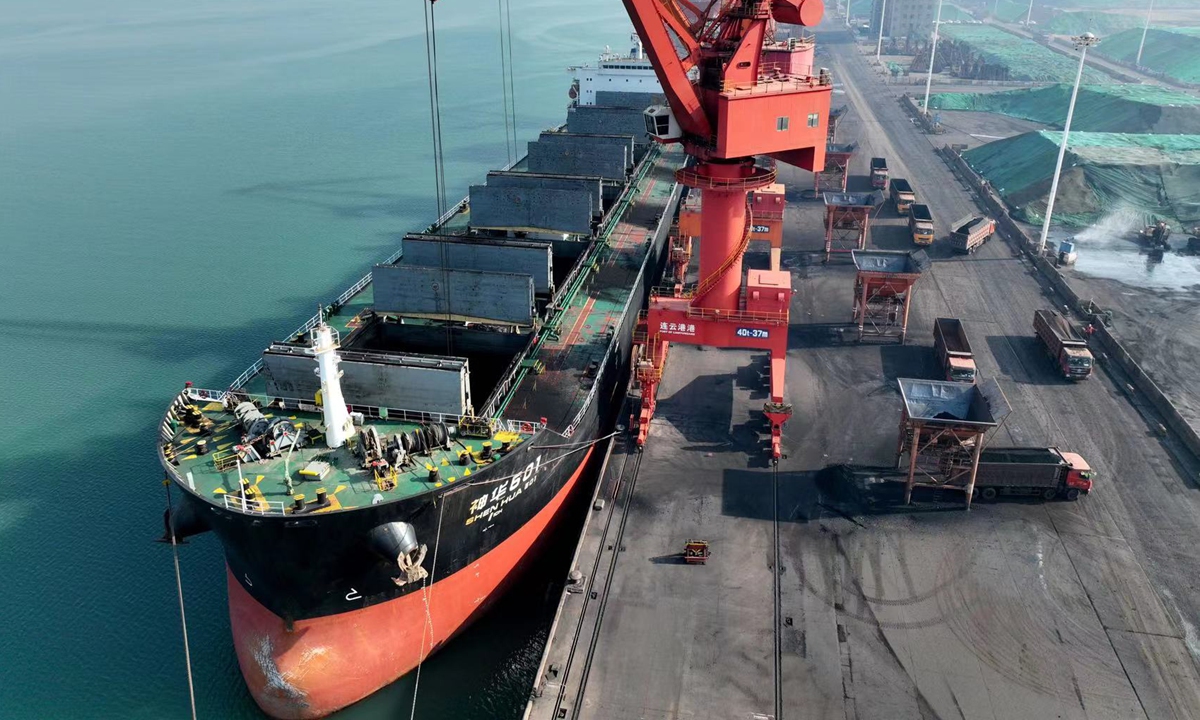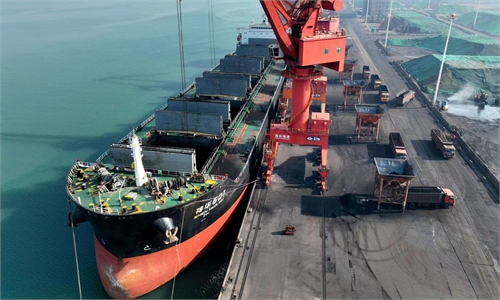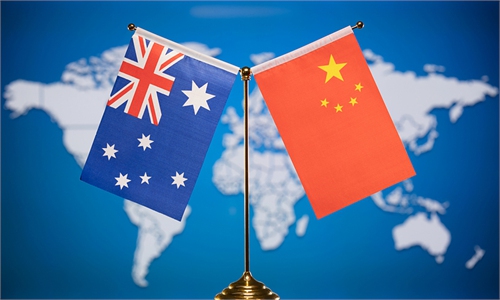China-Australia trade sees double-digit growth amid improved ties, economic recovery

Tons of thermal coal are unloaded and transported at a port in Lianyungang, East China's Jiangsu Province on December 21, 2022. Photo: VCG
China and Australia trade amounted to 259.7 billion yuan ($37.47 billion) in January and February, with both imports and exports achieving double-digit growth year-on-year, data from China's General Administration of Customs shows on Tuesday, amid the improved bilateral relations and the gradual unleashing of economic and trade potential.
Goods such as iron ore, beef and coal from Australia and consumer goods from China were the main sources of new growth, experts said, predicting stronger trades in the coming months as companies are restoring confidence and pursuing for win-win outcomes.
From January to February, China and Australia trade came to 259.7 billion yuan, a year-on-year increase of 15.7 percent, showing a trend of recovery amid improved bilateral ties.
China's exports to Australia stood at 85.18 billion yuan, a rise of 12.2 percent; imports from Australia grew by 17.5 percent or 174.52 billion yuan, customs data reads.
While there were no details regarding the specific trade goods, industry insiders and experts said that the bulk commodities and agricultural goods from Australia, together with China's consumer goods such as toys and fashion and clothing, were among the main drives for the improved figures.
Australia's iron ore accounted for the biggest portion of exports to China at more than 60 percent. Even during the low ebb of the bilateral trade relations, it remained the top position among all the other goods due to China's resilient market demand.
Other bulk commodities such as coal have also seen a resurgence, since the first shipment of Australian coking coal arrived at South China's Zhanjiang port on February 8, as companies are regaining confidence toward Australian goods in light of improved bilateral relations.
A source close to the matter told the Global Times on condition of anonymity that while there has been no arrive at Qingdao port, a major port for the bulk commodity trade, there is a speculation that the full resumption of Australian coal may take place in April.
There would be a total of 500,000 tons of Australian coking coal arriving at China's ports in February and March in several different batches, an insider said, noting that all these goods will be sent to China Baowu Steel Group Co (Baowu), China's largest steel company.
While four companies including Baowu were reportedly among the earliest to resume coal imports from Australia, the insider told the Global Times on Tuesday that there was one ship loaded with thermal coal, not for anyone of them, unloaded at a port in South China's Guangdong Province last Thursday.
"This would be the first shipments that were not ordered from any of the four companies," the individual said, indicating the fresh sign of a further trade recovery between the two countries.
Other Australian goods such as timber, beef and lobster have also seen a tentative recovery, the Global Times learned from industry insiders.
Chen Hong, president of the Chinese Association of Australian Studies and director of the Australian Studies Centre at East China Normal University, told the Global Times on Tuesday the encouraging trade performance is within expectation with the bilateral relationship significantly improving, a positive outcome of the Bali summit.
Other factors include the joint efforts toward economic recovery, which further unleashed the demand for a stronger trade, Chen said.
China's economic recovery needs a score of Australian agricultural, husbandry and mining products, which represent the major part of China's imports, while Chinese-made competitive products such as automobile and other daily commodities such as household appliances have also been a strong driver to the trade growth, experts said.
However, while the bilateral trade has regained some positive momentum there are still uncertainties that need to be addressed before full market confidence can be restored.
For example, the Australian government's fluid stance on Chinese investment in Australia, in areas such as rare earths have still posed concerns among Chinese investors.
"Surely, there are some trade disputes still lingering, but as the two sides are working on a joint solution, things can be settled," Chen said, noting that products such as coal and lobsters from Australia are expected to further resume and expand their share in the Chinese market.
Moreover, a fair and balanced approach is needed in resolving the economic and trade issues, Chen said, noting that Australia also need to remove the discriminatory barriers so as to make it smoother for Chinese businesses looking to investment in Australia, which is necessary to the full recovery of the bilateral economic cooperation.


